

PORTFOLIO

ZIMBABWE
Faces In A Torn Nation ...
Cindy Ellen Russell
crussell@starbulletin.com
Unique to Zimbabwe is the formation of its own apostolic church. HEALING A NATION
Founded in 1934 during the midst of the world depression, a black gardener named Mazoe lay on his death bed and had a vision. He claimed that he died and went to heaven, where he was greeted by Saint Peter and all the twins who had been killed at the hands of the Shona people. At that time it was a tribal custom to put to death the first born of twins because they were considered bad luck.
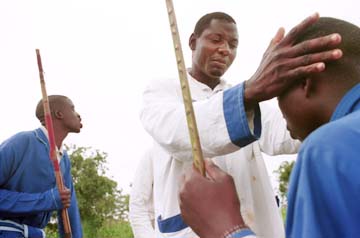
|
Angered by their untimely deaths, the twins denied Mazoe access to heaven and demanded that God commence Judgment Day. Mazoe pleaded to the twins and Saint Peter for forgiveness for the Shona, but they would not listen. Desperate, Mazoe asked to speak to Jesus.His wish was granted. Mazoe explained to Jesus that his people needed a second chance. He said that it was unfair to condemn them because they did not have a prophet to call their own. Jesus agreed and declared Mazoe to be an apostle of the Shona.
When he awoke, he shared his vision and knowledge by denouncing colonial-based Christian churches. He preached to his followers outdoors so they could be closer to God and be free of church taxes. He also denounced traditional tribal superstitions. By doing so, Mazoe created a unique religion that continues to attract followers to this day.
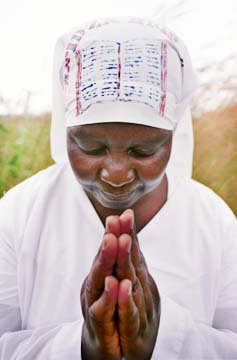
|
When Brenda Chibvongodze was born with albinism, her mother, Jane Rukanda, would not listen to her husband who insisted that they abandon their daughter. Instead, Jane took Brenda and left her husband. Since then, Jane has remarried. She and her new husband, Patson Gwashavanhu, have had three children. BORN WITHOUT SKIN
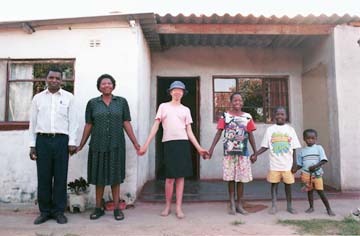
|
As with the firstborn of twins, when an albino was born in traditional Shona society, the midwife would promptly dispose of the infant.Once an inexplicable occurrence to the Shona people, albinos were thought of as individuals "born without skin," cursed and, worse yet, beings capable of angering the ancestral spirits of worship.
Although this practice no longer takes place, cultural stigmatism of albinos remains.
A hereditary condition resulting in a lack of skin pigmentation, albinism is characterized by pale skin, eyes and hair.
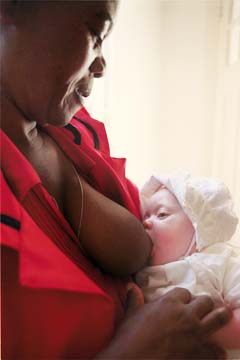
|
Because of this condition, albinos not only are subject to discrimination by others, but also are prone to a variety of health complications such as blindness and skin cancer.Approximately 4,000 to 5,000 albinos live in Zimbabwe, and many belong to the Zimbabwe Albino Association.
PARTY TIME
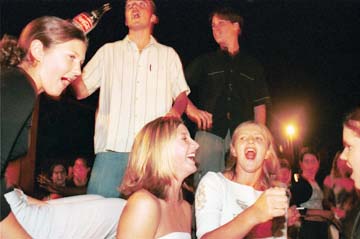
|
In the parking lot of a bowling alley in Avondale, hundreds of teenagers gather on Friday nights to socialize and party.Singing, laughing and shouting, they could be members of any suburban community. But they're not.
They represent a fraction of the 1 percent of whites living in the African nation of Zimbabwe.
Most of these teens were born in Zimbabwe to parents who own businesses and farms. However, because of the highly charged issue of land reform, compounded by the current economic and political crisis, most of these teens probably will leave Zimbabwe.
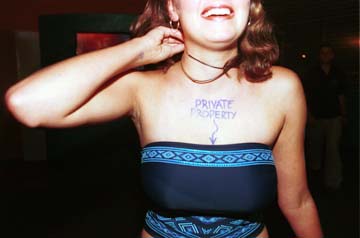
|
Their future is uncertain, but one point is assured: This is a generation that will not receive the privileges granted to their forefathers by nearly a century of colonial and white rule.
TABOO
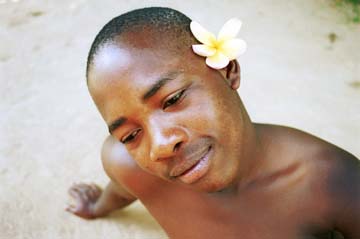
|
Sexuality is a taboo topic in black Zimbabwean society. But in 1995, Zimbabwean President Robert Mugabe broke the silence. In an attempt to ban Gays and Lesbians of Zimbabwe (GALZ), a local organization, from participating in an annual book fair, Mugabe referred to homosexuals as being "less than dogs or pigs." Instead of generating public support against homosexuals, Mugabe's comment focused international attention on the plight of Zimbabwean gays and lesbians.

|
Since 1995, GALZ has grown to about 300 members and participation at the book fair has become an annual event. However, discussing sexuality still is taboo.
Click for online
calendars and events.